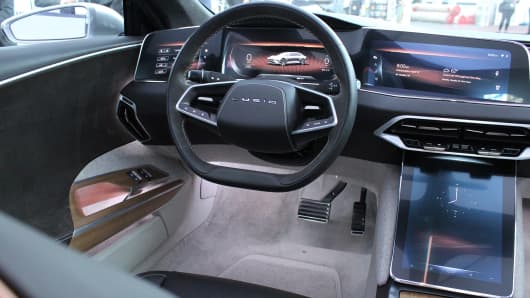Robert Ferris | CNBC
The Lucid Air Alpha test car, displayed at the New York Auto Show, reached a software-limited 217 miles per hour on a text track in Ohio.
Luxury electric car maker Lucid is building a high speed charging network for electric cars across the United States with Volkswagen, the companies said Tuesday.
According to the deal, VW subsidiary Electrify America and Lucid will build a network of 500 charging sites across 40 U.S. states by the end of 2019.
The deal gives Lucid another leg up against Tesla and signals increasing competition in the luxury electric car segment.
Lucid, which is based in the San Francisco Bay Area, plans to start producing its own upscale electric sedan in 2020.
The company recently upped the ante in the race to catch Tesla after receiving $1 billion investment from the Saudi government's Public Investment Fund. The company's chief technology officer is Peter Rawlings, who was former Tesla's chief engineer, and who worked on the team that developed the Model S sedan.
Robert Ferris | CNBC
The interior of a Lucid Air on display at the New York Auto Show on April 13, 2017.
Legacy automakers such as Jaguar and Volkswagen subsidiary Audi have recently debuted their own high-end electric cars designed to take a piece of the market where Tesla is the most recognizable brand. Tesla is the only other automaker with a dedicated charging network, with 1,344 of its high-speed Supercharger stations around the world.
Volkswagen started the Electrify America program as part of its settlement with the U.S. from its diesel emissions scandal, after it was discovered the automaker used devices to cheat diesel emissions tests. The company agreed to spend $2 billion in the U.S. to promote electric vehicle technology.

